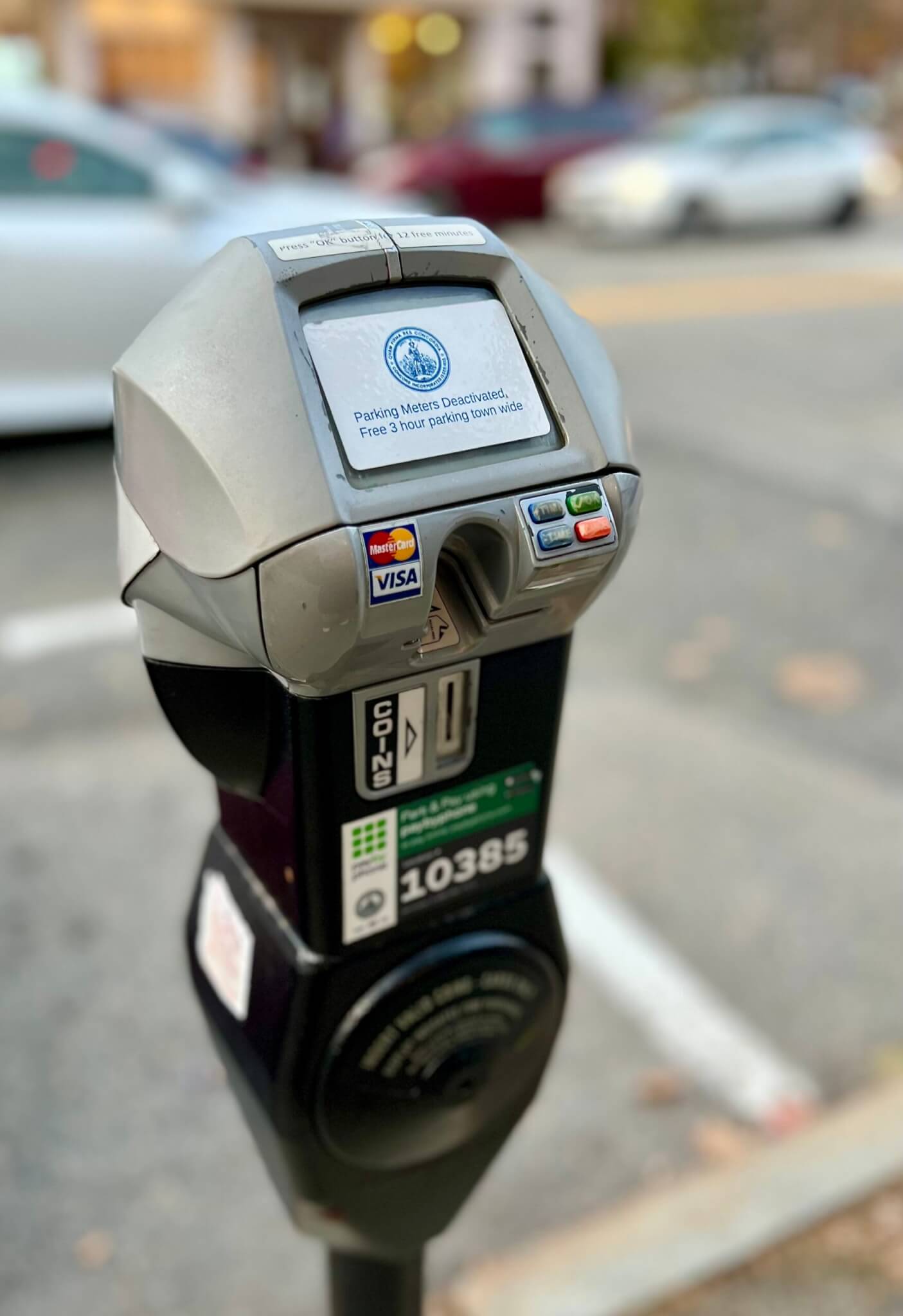Concord’s long-stalled parking meters are on their way out of town.
The town previously installed “smart meters” that let drivers pay for parking cashlessly via an app. They rely, of course, on good cellular service — which Concord notoriously lacks.
Most meters in Concord Center and West Concord will be removed, per a vote of the Select Board to authorize the town manager to have them taken out.
Economic Vitality Manager Mimi Graney, who investigated the parking situation at Select Board Chair Henry Dane’s request, said Concord had 339 meters on 194 poles according to 2016 correspondence between the town and contractor IPS.
Concord is required to maintain paid parking near its MBTA stations, she said; the rest of the town’s meters are now inactive.
Speaking at the November 20 Select Board meeting, Graney said the town would have to go out to bid to pull the meters, as the Department of Public Works can deal with pole repairs but not a wholesale removal project. In West Concord, she noted, meters removed for recent road work have not been replaced.
Deputy Town Manager Megan Zammuto said the cost of removing meters townwide wasn’t yet clear.
Board member Mark Howell said he was concerned that if Concord started taking out meters without looking back at the work already done on an overall parking management plan, “we run the risk of just doing something that costs money without really being clear about what the objectives are.”
He said if Concord does want to charge for parking in the future, it could potentially be through hard-wired kiosks rather than meters that need a reliable cellular signal to work.
Participating by phone, Board member Linda Escobedo said she had parking concerns related to people with disabilities. She also questioned where parking revenues were going, because even though the meters were largely not working, “there was still a fair amount of money coming in.”
Town Manager Kerry Lafleur said Town Meeting did not authorize the parking meter revolving fund, so any money from the meters goes into the general fund.
Graney’s report said at rates from 50 cents to $1 per hour, about $7,727 came in from parking meters from July to October — including via the PayByPhone function, which was taken offline over the summer, and from people who fed the meters with coins despite the “deactivated” stickers plastered on them.
For paid lots near MBTA stations, Graney reported a total of $9,295 collected from July to October via PayByPhone, plus additional revenue from permits. The town keeps 60% of those proceeds and must cover the PayByPhone contract.
Dane said his understanding is the current meters are now obsolete, so if Concord wanted to relaunch a paid street parking program, they’d have to be replaced. Graney noted each pole cost $175 to install, so if they were removed, the town would need new poles and meters to go back to meter parking.
“It would be very expensive to re-establish the meter program,” Lafleur confirmed.
Considering “staff time is short and money is getting very short,” Board member Terri Ackerman questioned the downside of just leaving the meters alone for now instead of paying to get them out.
“Aside from the fact that [the meters] are revenue neutral and there is some doubt as to whether they are effective … you get high snowbanks along the edge of the sidewalk so that people can’t get out of their cars,” Dane said.
“It is a hazard in the winter, especially [since] we just got [a] grant for making the town more age-friendly.”
Graney’s report on the meters also quoted Community Safety Officer Ron Holsinger of the Concord Police Department as saying “removing the meters would generally be safer. They make snow removal difficult, creating snowbanks. This causes people to walk in the street or possibly fall.”
Holsinger continued, “Cars crash into them on occasions, but they would not act as a bollard to stop a fast-moving vehicle. People put stickers or deface the meters, use them as bike storage (blocking the sidewalk), and I’ve even seen folks staring at their phone walk into them. ”
Asked by Board member Mary Hartman if there were other parking-related problems associated with the offline meters, Graney said Concord Police told her more complaints typically come in from local merchants about delivery trucks. She said the department had only issued “about $3,000” worth of parking tickets in the last few months.
Ultimately, Hartman called the parking meters “kind of a solution looking for a problem that we’re learning maybe wasn’t a problem.”
Additionally, Hartman said, “I do have a problem, myself, walking over those snowbanks in the winter because of meters — and I think they look really bad, so I wouldn’t be in favor of waiting for another study.”
The Board vote to remove the on-street meters was 4-1, with Howell dissenting.





